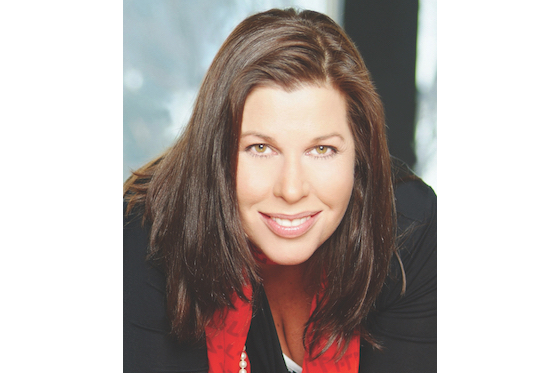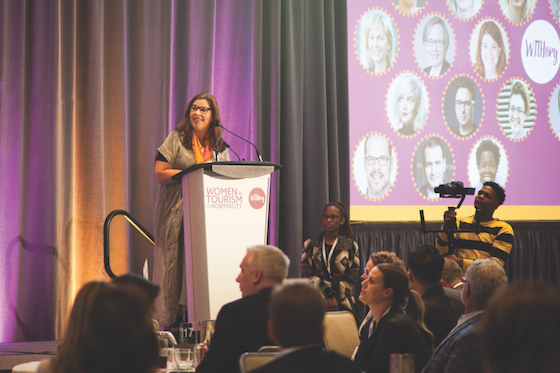When Anne Larcade was climbing the corporate ladder in Canada’s hospitality industry, she usually found herself the only woman in senior leadership.
“I didn’t think about it at the time,” she says. “You get accustomed to the executives at the conference room table being all men.”
As she reflected on her career in hotel management, turnarounds and consulting, she considered how to use her experience and connections to help women advance to C-suite positions, especially in finance, development and operations, where they are sorely underrepresented.

“Women deserve a seat at the table. I’ve seen many years of women not being able to break the ceiling,” she says. “Deeply ingrained bias prevents meaningful advancement of women to senior roles and equal pay.”
In 2017, Larcade launched WITHorg, an initiative to provide resources, networking and advocacy to help women progress in tourism and hospitality. The organization’s third summit, which offers workshops, panel discussions and motivational talks, is scheduled for May in Toronto. “It’s sad that the needle hasn’t moved on pay equity and advancement to senior roles,” Larcade says.
Larcade is among a generation of women advocating for closer parity in the executive ranks. The Atlanta-based Castell Project has produced studies that underscore the absence of women at senior levels. Castell’s 2019 survey shows that although nearly half of managers and directors are women, they represent only 30% of vice presidents. That presence continues to thin dramatically at higher levels: Only 11% of presidents and 5% of CEOs are women.
“Anne is a total go-getter,” says Peggy Berg, Castell Project director. “She has a level of credibility and the ability to go to other CEOs for sponsorships or other support.”
Raised in Ontario, Larcade jumped into hospitality early. She managed bars, ran a boutique hotel and owned two travel agencies. She was restless and continually looked, as she put it, “for more stimulation.” In the early 1990s she coordinated the C$5 million purchase of a 103-room resort and conference center in Ontario. She grew revenue by two-thirds to nearly C$5 million and reduced problematic staff turnover.
From this base she established a consultancy in hotel turnarounds, Destination Management. During part of this time, she was raising two children as a single mom. “I brought my kids to work,” she recalls. “When you own your own business, you can do that, but not all women have that freedom.”
Larcade’s next stop was Canadian Hotel Income Properties in Toronto, the country’s first public hotel REIT, where she served as regional director of operations. After three years she took on the turnaround of the iconic Ontario resort Deerhurst. “We put it back on the map,” she says. In 2005 she established her own company, Sequel Hotels and Resorts, which launched with the acquisition of three properties and shifted to asset management and consulting.
‘More action’
Why had she encountered so few female peers in her tour through corporate boardrooms? Over cocktails in May 2013 at the Shangri-La Hotel in Toronto with Katie Taylor, who recently had stepped down as CEO of Four Seasons Hotels and Resorts, the pair discussed the pay gap and gender bias. They went on to explore developing a conference for women in hospitality. Taylor agreed to serve as honorary chair, and the inaugural summit took place at Toronto’s InterContinental Hotel in September 2017.
“I was keen to raise awareness of the breadth of opportunities for women and establish a venue for women to connect,” says Taylor, now chair of the Royal Bank of Canada. Larcade also teamed up with Rosanna Caira, editor and publisher of Ontario-based Hotelier magazine, as?partner for the summit.
WITHorg generates revenue from membership fees and summit enrollments. The organization has grown to 380 members who receive connections to peers and organizations as well as resources for professional growth. It’s gained global traction: Larcade says she’s heard from a taxi owner in South Africa and a hospitality designer from Dubai.
Gender bias remains a giant hurdle, Larcade says. “But I’m hearing company presidents say, ‘I didn’t realize we had a barrier, we need to look closely at this.’”
She adds, “There has to be less talk and more action. The training has to be innovative and interesting, and results have to be measured.” Women, too, must step up and ask for jobs and opportunities: “Tell your HR department, ‘This is what I want to do.’” Millennials, she adds, won’t stand by. “They feel they’re entitled – we taught them that.”
Larcade is thinking big. Her initiative is rooted in hospitality and tourism but could expand into adjacent areas such as car rentals and cruise ships, and, ultimately banking, technology and angel investing.
“If we help women, we can end poverty,” she says. “I’ve found that using superordinate goals usually drives better outcomes. Is ending it possible? If that is our goal, then it is possible.”

